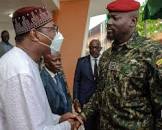Several retired African heads of state have successfully switched to offering services for lasting peace on the continent.
By Oumar Dembele
Not all of them worry about their future when they leave office.
In recent years, many have peacefully handed over to successors elected by their countries and assume a second shot at life after the presidency.
While some prefer to retire from politics and enjoy their retirement, others choose to remain on the international scene to contribute their expertise in building a democratic Africa.
In the eastern Democratic Republic of Congo (DRC), for example, Uhuru Kenyatta has been working for several weeks to end the violent clashes between the army and the rebels of the March 23 Movement (M23).
After handing over power to his successor William Ruto a little less than three months ago, the former Kenyan head of state is working to resolve the Congolese crisis, in which Rwanda is accused of backing the M23 rebellion, which has gained momentum in recent months.
As the new facilitator of the Community of East African States (EAC) for peace in eastern DRC, Kenyatta is carrying out his mission with panache.
He completed a two-day visit to the Congolese capital Kinshasa on Monday, November 14, during which he consulted with ministers, diplomats and some 40 community representatives from the two Kivus and Ituri provinces.
Among them were traditional chiefs and members of civil society who made the trip.
From presidents to mediators
Further afield, in the western region of the continent, where several countries are troubled by jihadist violence and a series of coups, former heads of state are being called upon to seek peace and negotiate “reasonable” transitions with military juntas.
This is the case with Mahamadou Issoufou, who led Niger from 2011 to 2021.
Mediator of the Economic Community of West African States (ECOWAS) for Burkina Faso, where he obtained the reduction of the duration of the transition to 24 months instead of the 36 initially planned by the junta in power, he regularly travels the region since he is also the head of the Independent High Level Panel on Security and Development in the Sahel.
This mission was “entrusted to him (by) the UN Secretary General in connection with the African Union (AU), the Economic Community of West African States (ECOWAS) and the G5 Sahel,” Issoufou said in a recent speech.
Issoufou during a recent audience in Bamako with Colonel Assimi Goita, the president of the transition in Mali, a country where former Nigerian president Goodluck Jonathan (2010-2015) is also a frequent visitor in his capacity as ECOWAS negotiator.
In Guinea, former Beninese President Thomas Boni Yayi (2016 – 2016) managed to bring together the positions of the regional organization and the military junta led by Colonel Mamady Doumbouya.
After several months of mediation by President Patrice Talon’s predecessor, the military authorities in Conakry agreed to return power to civilians after two years instead of the planned three years.
“In a dynamic compromise, experts from ECOWAS and Guinea jointly developed a consolidated timetable for the transition spread over 24 months,” the regional organization said in October.
Tragic fates
The list of former African heads of state on the international scene is not exhaustive.
But it is clear that their fate is more honorable than the fate of some of their peers, such as Burkina Faso’s Blaise Compaore, Guinea’s Alpha Conde and Moussa Dadis Camara, and Laurent Gbagbo of Cote d’Ivoire.
The latter two were forced from power by street protests or by the army before hitting legal roadblocks.
In Guinea in particular, the trial of former junta leader Moussa Dadis Camara and a dozen co-defendants in the September 28, 2009 stadium massacre is underway in Conakry.
Overthrown by the army a year after his election for a third term of office, his successor Alpha Conde is also in hot waters away from his country.
On November 3, the Guinean judiciary ordered the prosecution of the former president, currently in Turkey for medical reasons, and more than 180 of his former ministers and officials for alleged corruption.
ODL/te/fss/as/APA


